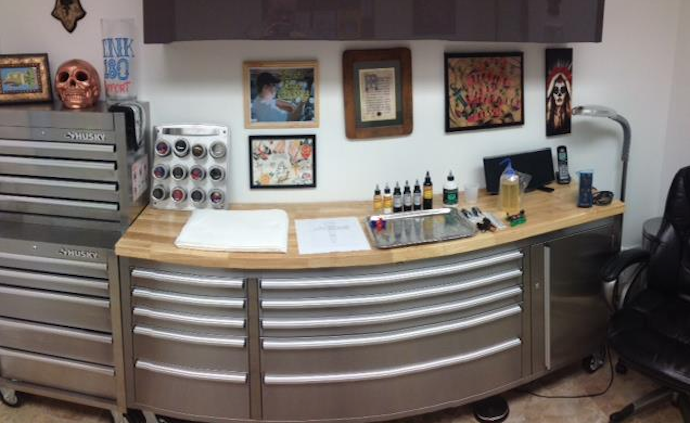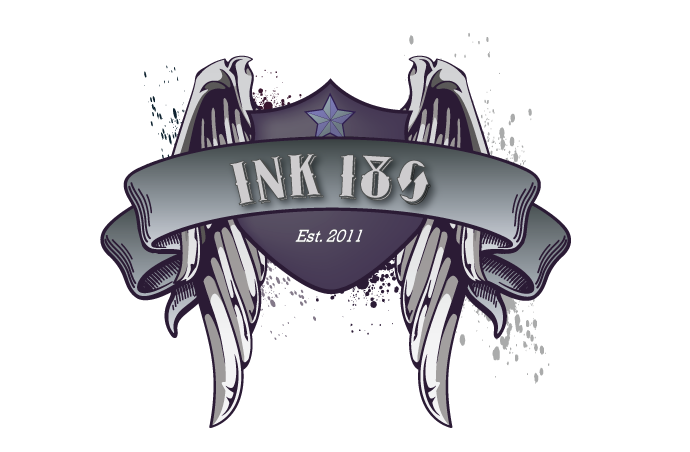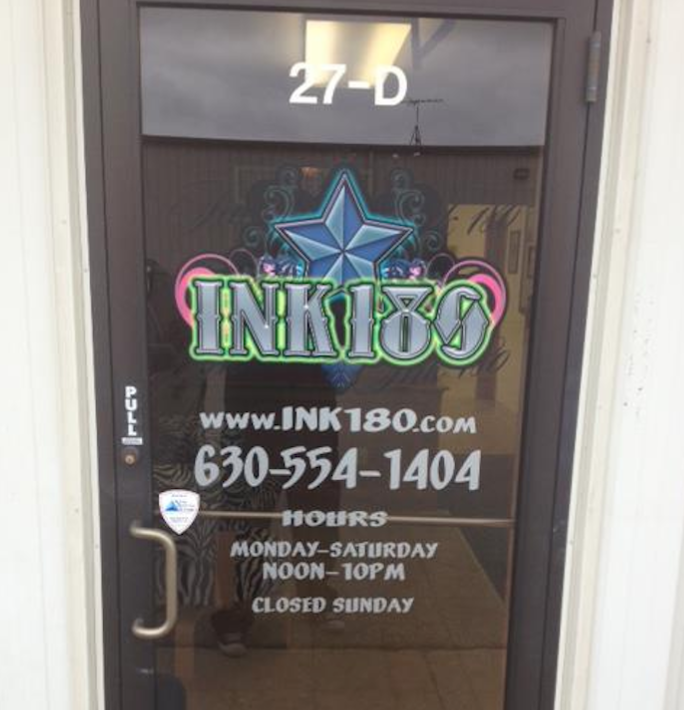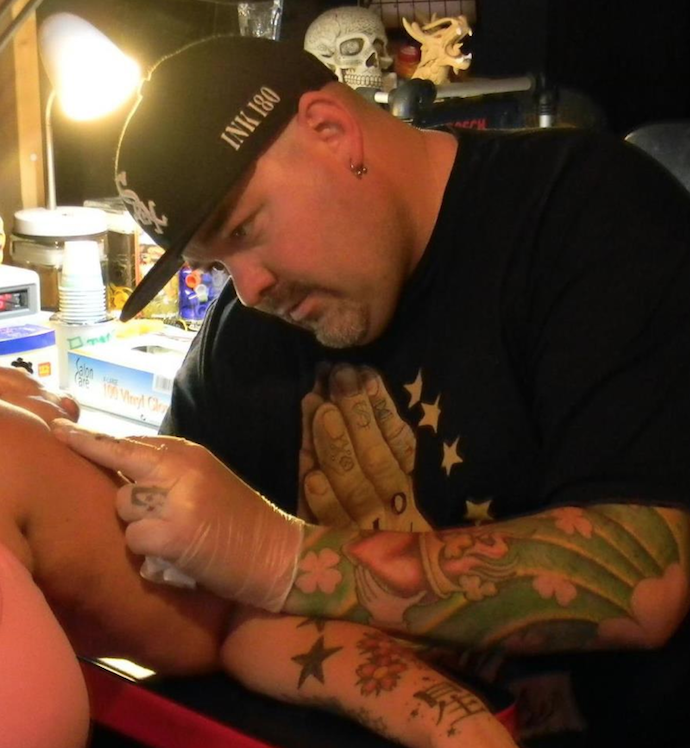Ink 180 Gives Second Chances With Tattoo Cover-Ups
Countless people hear their callings while attending church, although you wouldn’t necessarily associate such epiphanies with a tattoo artist. But that’s exactly what happened to Chicago-area tattooist Chris Baker as he led a youth group discussion in 2011. Baker wanted to encourage the group’s artistic spirit, and the youth thought it would be a great idea to paint murals to cover up graffiti on area buildings. Suddenly Baker envisioned himself using his artistic talents to cover more than graffiti. He would use his skill as a tattoo artist to cover markings on people that tell the stories of painful and destructive pasts.
Gangs use tattoos to mark members’ allegiance and to signify hierarchy within their ranks. Baker was well aware of these trademark symbols after spending years on the streets of Los Angeles. And the permanent markings make it difficult for gang members to break away. Even if they escape they may find it especially difficult to find employment, as well as be particularly suspicious to law enforcement and vulnerable to gang reprisal. So Baker contacted a friend in local law enforcement to see if a tattoo cover-up service could be beneficial. He found the service wasn’t only useful but desperately in need.
In October 2011 Baker created Ink 180 and began traveling to correctional facilities, offering his life-changing ministry to prisoners who wanted to leave their destructive pasts behind. In its first year, Ink 180 completed 508 tattoo cover-ups and removals at absolutely no charge, in addition to Baker’s tattoo business. And until recently, the ministry hadn’t yet received not-for-profit status, meaning the $13,000 in operational costs came out of Baker’s own pocket. The total serviced is now well over 700.

Image via Ink 180
“It’s a necessary thing to have out there to help people get a second chance. God gave me the ability to be a tattoo artist,” Baker told Wall Street Insanity. “I’m doing what I love so it’s never work for me.”
Baker still remembers the first former gang member he serviced through Ink180, a former Latin King who had been shot eight times two months earlier. Baker covered up two tattoos. Afterward, the man rescued his brother from the gang, and together the two moved to Florida where they attended trade school and now rescue kids from gangs. Baker said he often sees the people he assists pay it forward.
And Ink180 doesn’t only service former gang members. Baker has covered prison tattoos, homemade “wannabe gang” tattoos and—most disturbing—trafficking tattoos. Last year while Baker was attending a meeting with Homeland Security’s gang division, he was invited to discuss the Ink180 ministry with another unit upstairs—the trafficking division. Initially, Baker thought this was drug trafficking and didn’t understand what that had to do with tattoos. But he quickly learned he was about to meet with officers dealing in human trafficking operations. Baker learned how—right here in the United States—hundreds of women and girls are held captive by gangs, drug dealers and organized crime. They are forced into prostitution, but the industry goes much further than pimps and hos. The girls are considered property that can be bought, sold… and disposed of. Their captors often tattoo them with bar codes or other logos so if they ever escape they can easily be tracked back to their “owners,” similar to the way cattle are branded by ranchers. The tattoos make the girls victims for life, never knowing when the wrong person might see their mark and contact their previous captor.
Most of the young women could never afford to cover up or remove the tattoos, so Homeland Security asked Baker if Ink 180 could help. Baker was moved by the situation and immediately agreed to work on many of the victims being moved through the rehabilitation and relocation process, covering the markings with the girls’ choice of artwork, including hearts, flowers and stars. And he’s extremely careful and protective of the young women. Since street gangs run portions of human trafficking, Baker never does trafficking cover ups on the same days as gang cover ups.
Baker’s favorite Ink 180 success story was actually a trafficking victim named Nicole. After her pimp was arrested, she served as a key witness in his trial. He was convicted and sentenced to life without the possibility of parole. In fact, at sentencing the judge said the stiff sentence was in part because of the way he “branded” his victims, including Nicole. Baker has been removing those “brands” from Nicole, but he has also had an opportunity to meet her “church family,” as well as her three children.

Image via Ink 180
Although she has no idea who the children’s fathers are—they were born while she was being trafficked—Nicole works two jobs to support them. She has also worked with law enforcement to create a “john school,” for those convicted of soliciting prostitution. Not only did Nicole help design the class (which will be similar to DWI classes), she will be teaching the classes, offering a first-hand look at the true costs of soliciting.
“That’s what keeps us going, we hear all those stories,” Baker said.
Baker hopes the success of Ink 180 will lead other artists throughout the country to take up the cause. He told Wall Street Insanity he’s approached quite often, in fact.
“One of our goals right now is to expand this,” he said. “A lot of tattoo artists want to do some good word for charity.”
Of course it costs money to run any charity, and tattoo materials aren’t cheap. Baker’s not big on fundraising, though. The time he would spend raising money to support Ink 180 could be better used covering and removing tattoos for people. But the non-profit does accept tax-deductible donations from its Web site. He’s also recently heard from a business offering to donate some supplies.

Image via Ink 180
And believe it or not, Baker has received criticism for helping people out pro bono.
“Still some are haters and upset we do for free,” he said. “The folks we work with hardly have money to eat,” so it’s unlikely they would go out and pay for a cover-up somewhere else. “Some (of the critics) used to be friends of mine, but at the end of the day I know what I’m doing is the right thing, we’re just helping people get a second chance at life.”










































